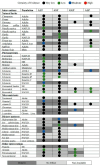Natural products and dietary interventions on liver enzymes: an umbrella review and evidence map
- PMID: 38371505
- PMCID: PMC10869519
- DOI: 10.3389/fnut.2024.1300860
Natural products and dietary interventions on liver enzymes: an umbrella review and evidence map
Abstract
Background: The association between natural products and dietary interventions on liver enzymes is unclear; therefore, this study aimed to examine their effects on liver enzymes in adults.
Methods: PubMed, Embase, and Cochrane Library of Systematic Reviews databases were searched from inception until March 2023. The Assessment of Multiple Systematic Reviews-2 (AMSTAR-2) and Grading of Recommendations Assessment, Development, and Evaluation (GRADE) systems were used to assess the methodological and evidence quality, and the therapeutic effects were summarized in a narrative form.
Results: A total of 40 meta-analyses on natural products (n = 25), dietary supplements (n = 10), and dietary patterns (n = 5) were evaluated, and results were presented in a narrative form. The overall methodological quality of the included studies was relatively poor. The results indicated that positive effects were observed for nigella sativa, garlic, artichoke, curcumin, silymarin, vitamin E, vitamin D, L-carnitine, propolis, and polyunsaturated fatty acids on certain liver enzymes. The dietary patterns, including high-protein, Mediterranean, and calorie-restriction diets and evening snacks, may reduce liver enzymes; however, other supplements and herbs did not reduce liver enzyme levels or have minimal effects. The evidence quality was generally weak given the risk of bias, heterogeneity, and imprecision.
Conclusion: This umbrella review suggests that natural products and dietary interventions have beneficial therapeutic effects on liver enzymes levels. Further clinical trials are necessary to establish the effectiveness of supplements that reduce liver enzymes.
Keywords: dietary interventions; evidence map; liver enzymes; natural products; umbrella review.
Copyright © 2024 Li, Wu, Zhao, Song and Wen.
Conflict of interest statement
The authors declare that the research was conducted in the absence of any commercial or financial relationships that could be construed as a potential conflict of interest.
Figures
Similar articles
-
Nigella sativa and health outcomes: An overview of systematic reviews and meta-analyses.Front Nutr. 2023 Mar 28;10:1107750. doi: 10.3389/fnut.2023.1107750. eCollection 2023. Front Nutr. 2023. PMID: 37057067 Free PMC article.
-
Ginseng and health outcomes: an umbrella review.Front Pharmacol. 2023 Jul 3;14:1069268. doi: 10.3389/fphar.2023.1069268. eCollection 2023. Front Pharmacol. 2023. PMID: 37465522 Free PMC article.
-
Efficacy and safety of dietary polyphenol supplementation in the treatment of non-alcoholic fatty liver disease: A systematic review and meta-analysis.Front Immunol. 2022 Sep 9;13:949746. doi: 10.3389/fimmu.2022.949746. eCollection 2022. Front Immunol. 2022. PMID: 36159792 Free PMC article.
-
Diet in the management of type 2 diabetes: umbrella review of systematic reviews with meta-analyses of randomised controlled trials.BMJ Med. 2023 Nov 9;2(1):e000664. doi: 10.1136/bmjmed-2023-000664. eCollection 2023. BMJ Med. 2023. PMID: 38027413 Free PMC article.
-
The future of Cochrane Neonatal.Early Hum Dev. 2020 Nov;150:105191. doi: 10.1016/j.earlhumdev.2020.105191. Epub 2020 Sep 12. Early Hum Dev. 2020. PMID: 33036834
References
Publication types
LinkOut - more resources
Full Text Sources



